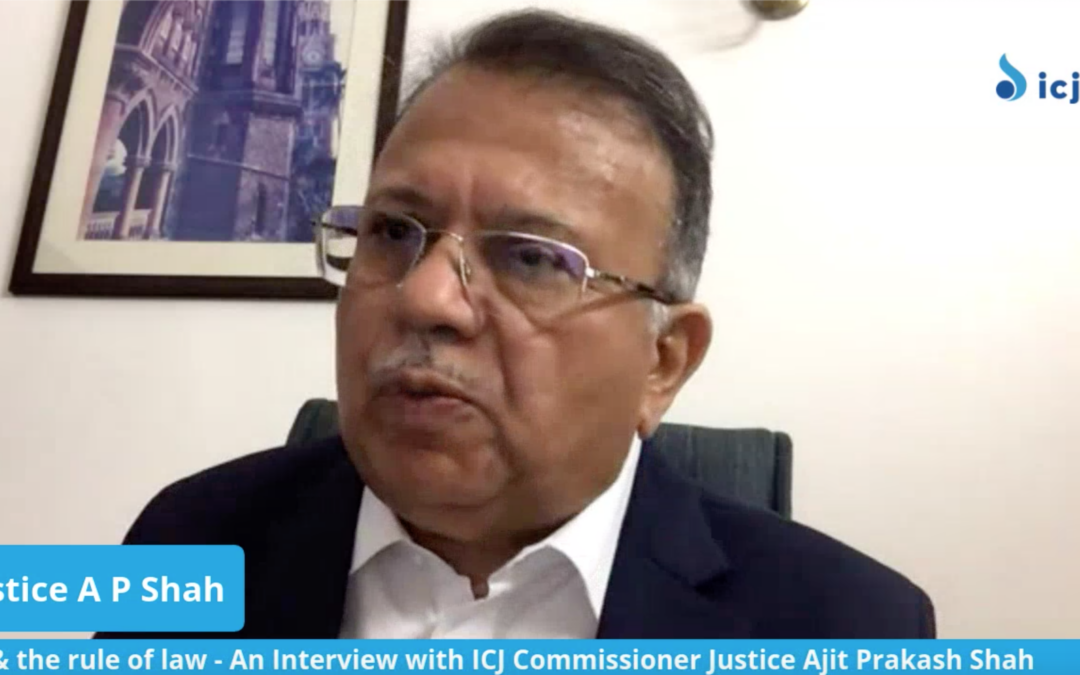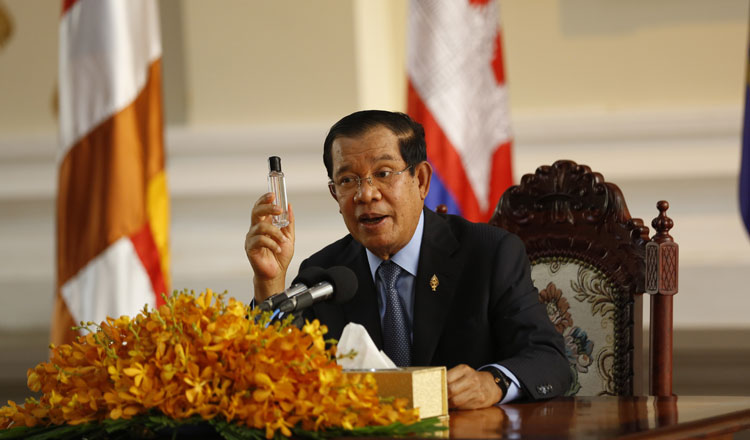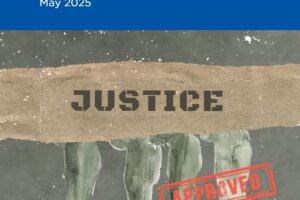
Jun 30, 2020 | Multimedia items, News, Video clips
In a wide-ranging interview recorded on June 4 2020, ICJ Commissioner and former Chief Justice of the High Court of Delhi, Ajit Prakash Shah, called on the Indian judiciary to exercise its responsibility to protect peoples’ human rights and “reprise its role as protector of Indian people” in the context of the Covid-19 epidemic.
In April and May 2020, the Indian Supreme Court dismissed several petitions and applications concerning the rights of internal migrant workers.
These included petitions demanding that migrant workers be moved to shelter homes and provided with basic needs and that payment of minimum wages be made to all migrant workers for the lockdown period.
The Court was also requested to direct the District Magistrates to identify those who are walking and ensure that they are provided with shelter and food and reach their destination, following the death of 16 internal migrant workers killed while sleeping on railway tracks while on their way back to their hometowns.
Finally, on 26 May 2020 the Court took suo moto cognizance of their predicament and, on 28 May 2020 ordered the Government to: register internal migrant workers; provide internal migrant workers free transportation home; and provide internal migrant workers with shelter, food, and water until they reach their homes.
This action was followed by another order on 9 June by which the Court ordered that: internal migrant workers are identified and sent to their hometowns within 15 days; and that all cases registered against those who had allegedly violated COVID-19 lockdown orders be considered for withdrawal.
In the interview, Justice Shah accented, in particular, the role of the Indian judiciary “as protector of Indian people” in respect of marginalized and disadvantaged people, including people living in poverty.
In addressing the question about internal migrant workers who were stranded during the recent COVID-19 lockdown, Justice Shah observed that for two months (March 24 2020 – May 28 2020) between the initiation of the lockdown and the rulings of the Supreme Court the Court appeared to have “remained skeptical” and in “denial” about petitions filed seeking redress for internal migrant workers.
Speaking in this context, Justice Shah reminded the Indian judiciary that Indian courts have historically been at “the forefront of giving effect to India’s international legal obligations,” including its economic, social, and cultural rights obligations encapsulated in International Covenant on Economic, Social and Cultural Rights.
They had done so in landmark cases such as PUCL v. UOI (in which it held that the right to life with dignity includes a right to food and a right to be free from hunger and starvation) and Chameli Singh v. UOI (in which it held that right to shelter includes adequate living space includes light, air, water, civil amenities, and sanitation).
While commending the Courts interventions in May 2020, Justice Shah pointed out that their lateness to react was damaging.
“Courts should have intervened earlier. They could have monitored the process of the return of the migrants to their home states and ensured basic wages were fixed and delivered.”
Justice Shah expressed hope that the 28 May 2020 order represented a turning point:
“Hopefully, going forward, the Court will act in the same spirit … to grant some reliefs to suffering migrant communities. In the future, the Court should take the lead and monitor these processes, serving as a guide to both the center and the state authorities and the bureaucracy for addressing these issues.”
Commenting on the role of lawyers during the COVID-19 crisis, Justice Shah expressed concern that law officers were castigating lawyers for approaching courts with petitions.
Watch the video
Additional Reading
- Briefing Papers
- India on the Brink of Hunger Crisis during COVID-19 Pandemic
- The Right to Water in India and the COVID 19 Crisis
- COVID-19 Pandemic Exposes India’s Housing Crisis
- Press Release: COVID-19: Indian authorities must act immediately to protect internal migrant workers stranded under intolerable conditions
Download (with additional information)
India-Justice-Shah-Interview-Web-Story-2020-ENG (PDF)

Apr 8, 2020 | News
The ICJ today warned that Cambodia’s draft Law on National Administration in the State of Emergency (“State of Emergency bill”) violates basic rule of law principles and human rights, and called on the Cambodian government to urgently withdraw or amend the bill in accordance with international human rights law and standards.
Last Friday, government spokesperson Phay Siphan explained that the government needed to bring a State of Emergency law in force to combat the COVID-19 outbreak as “Cambodia is a rule of law country”. The bill is now before the National Assembly and, if passed by the Assembly, will likely be considered in an extraordinary session convened by the Senate. The law will come into force once it has been signed by the King – or in his absence, the acting Head of State, Senate President Say Chhum.
“The Cambodian government has long abused the term “rule of law” to justify bringing into force laws or regulations that are then used to suppress free expression and target critics. This bill is no different,” said Frederick Rawski, ICJ’s Director for Asia and the Pacific.
“Any effective response to the COVID-19 outbreak must not only protect the rights to health and life, but be implemented in accordance with Cambodia’s human rights obligations and basic principles of the rule of law.”
Several serious shortcomings are evident in the State of Emergency bill, including:
- No delineation of a timeline for the imposition of a state of emergency, or criterial process for its termination. The bill provides vaguely that such declaration “may or may not be assigned a time limit. In the event that a state of emergency is declared without a clear time limit, such a state of emergency shall be terminated when the situation allows it” (article 3);
- Expansion of government powers to “ban or restrict” individuals’ “freedom of movement, association or of meetings of people” without any qualification to respect the rights to association and assembly in enforcing such measures (article 5);
- Expansion of government powers to “ban or restrict distribution of information that could scare the public, (cause) unrest, or that can negatively impact national security” and impose “measures to monitor, observe and gather information from all telecommunication mediums, using any means necessary” without any qualification to respect the rights to privacy, freedom of expression and information in enforcing such measures (article 5);
- Overbroad powers for the government to “put in place other measures that are deemed appropriate and necessary in response to the state of emergency” which can allow for significant State overreach (article 5);
- Severe penalties amounting to up to 10 years’ imprisonment of individuals and fines of up to 1 billion Riel (approx. USD 250,000) on legal entities for the vaguely defined offence of “obstructing (State) measures related to the state of emergency” where such obstruction “causes civil unrest or affects national security” (articles 7 to 9);
- No specific indication of which governmental authorities are empowered to take measures under the bill, raising concerns that measures could be taken by authorities or officials in an ad-hoc or arbitrary manner in violation of the principle of legality;
- No indication of sufficient judicial or administrative oversight of measures taken by State officials under the bill – The bill states that the government “must inform on a regular basis the National Assembly and the Senate on the measures it has taken during the state of emergency” and that the National Assembly and the Senate “can request for more necessary information” from the government (article 6) but does not clarify clear oversight procedures for accountability.
“The State of Emergency bill is a cynical ploy to further expand the nearly unconstrained powers of the Hun Sen government, and will no doubt be used to target critical comment on the government’s measures to tackle COVID-19,” said Rawski.
“If passed in its current form, this bill will reinforce the prevailing lack of accountability which defines the government in Cambodia. The government’s time would be better spent developing genuine public health policy responses to the crisis.”
Contact
Frederick Rawski, ICJ Asia Pacific Regional Director, e: frederick.rawski(a)icj.org
To download the statement with detailed background information, click here.
See also
ICJ report, ‘Dictating the Internet: Curtailing Free Expression, Opinion and Information Online in Southeast Asia’, December 2019
ICJ report, ‘Achieving Justice for Gross Human Rights Violations in Cambodia: Baseline Study’, October 2017
ICJ, ‘Cambodia: continued misuse of laws to unduly restrict human rights (UN statement)’, 26 September 2018
ICJ, ‘Misuse of law will do long-term damage to Cambodia’, 26 July 2018
ICJ, ‘Cambodia: deteriorating situation for human rights and rule of law (UN statement)’, 27 June 2018
ICJ, ‘Cambodia human rights crisis: the ICJ sends letter to UN Secretary General’, 23 October 2017





